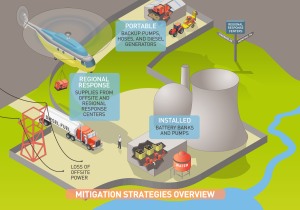Making Sure SAFER Resources Are Ready To Go
Posted by on October 16, 2014
 Part of the U.S. nuclear power industry’s response to the NRC’s post-Fukushima Mitigation Strategies
Order involves emergency equipment centers in Memphis, Tenn., and
Phoenix, Ariz. The centers have multiple sets of generators, pumps and
other equipment. The centers would send needed equipment to a U.S.
nuclear plant to maintain safety functions indefinitely if an event
disabled that plant’s installed safety systems.
Part of the U.S. nuclear power industry’s response to the NRC’s post-Fukushima Mitigation Strategies
Order involves emergency equipment centers in Memphis, Tenn., and
Phoenix, Ariz. The centers have multiple sets of generators, pumps and
other equipment. The centers would send needed equipment to a U.S.
nuclear plant to maintain safety functions indefinitely if an event
disabled that plant’s installed safety systems.The NRC’s been reviewing how an industry group, the Strategic Alliance for FLEX Emergency Response (SAFER), can move equipment from the response centers to plants. We observed two demonstrations SAFER ran in July and reviewed SAFER’s equipment, procedures, and deployment strategy. Overall, the NRC staff concludes that having the response centers and the group’s plans and procedures in place will enable plants to comply with the final phase of the Order.
The group has contracted with Federal Express (for both truck and aircraft shipment) to get supplies to a plant within 24 hours of a request. SAFER’s documentation of FedEx’s capabilities included a proven ability to work with the Federal Aviation Administration to get proper access to otherwise restricted airspace in the event that equipment must be flown to a nuclear power plant site.
One SAFER demonstration sent equipment by road from Memphis to the Three Mile Island plant in Pennsylvania. The NRC staff noted some areas for improvement, such as clarifying who’s responsible for unloading equipment at a site or where the equipment’s first tank of fuel will come from. SAFER responded by adding details to its plans and beefing up its training program.
The other demonstration simulated airlift of equipment from Phoenix to the Surry plant in Virginia. After the NRC shared its observations, SAFER gave our staff additional details on how it would obtain helicopters to bring supplies to a plant if area roads are impassable.
We also reviewed a report on the Memphis center’s test of packing the equipment to efficiently load and fit onto FedEx’s planes. Although the test generated a delivery schedule a few minutes longer than the industry expected, the NRC is satisfied that SAFER has applied lessons learned to streamline its approach and ensure SAFER can meet its own deadlines.
Our website’s Japan Lessons Learned section can give you more information about the mitigation strategy requirements and related guidance.

No comments:
Post a Comment